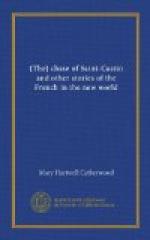The New Englanders charged them, a solid force, driving the light-footed bush fighters. But it was like driving the wind, which turns, and at some unexpected quarter is always ready for you again.
This long-range fighting went on until nightfall, when the English commander, finding that his tormentors had disappeared as suddenly as they had appeared in the morning, tried to draw his men together at the St. Charles ford, where he expected some small vessels would be sent to help him across. He made a night camp here, without any provisions.
Gaspard’s house was dark, like the deserted Beauport homes all that night; yet one watching might have seen smoke issuing from his chimney toward the stars. The weary New England men did not forage through these places, nor seek shelter in them. It was impossible to know where Indians and Frenchmen did not lie in ambush. On the other side of the blankets which muffled Gaspard’s windows, however, firelight shone with its usual ruddiness, showing the seignior of Beauport prostrate on his old tenant’s bed. Juchereau de Saint-Denis was wounded, and La Hontan, who was with the skirmishers, and Gaspard had brought him in the dark down to the farmhouse as the nearest hospital. Baron La Hontan was skillful in surgery; most men had need to be in those days. He took the keys, and groped into the seigniory house for the linen chest, and provided lint and bandages, and brought cordials from the cellar; making his patient as comfortable as a wounded man who was a veteran in years could be made in the first fever and thirst of suffering. La Hontan knew the woods, and crept away before dawn to a hidden bivouac of Hurons and militia; wiry and venturesome in his age as he had been in his youth. But Saint-Denis lay helpless and partially delirious in Gaspard’s house all Thursday, while the bombardment of Quebec made the earth tremble, and the New England ships were being splintered by Frontenac’s cannon; while Sainte-Helene and his brother themselves manned the two batteries of Lower Town, aiming twenty-four-pound balls directly against the fleet; while they cut the cross of St. George from the flagstaff of the admiral, and Frenchmen above them in the citadel rent the sky with joy; while the fleet, ship by ship, with shattered masts and leaking hulls, drew off from the fight, some of them leaving cable and anchor, and drifting almost in pieces; while the land force, discouraged, sick, and hungry, waited for the promised help which never came.
Thursday night was so cold that the St. Charles was skimmed with ice, and hoarfrost lay white on the fields. But Saint-Denis was in the fire of fever, and Gaspard, slipping like a thief, continually brought him fresh water from the spring.




